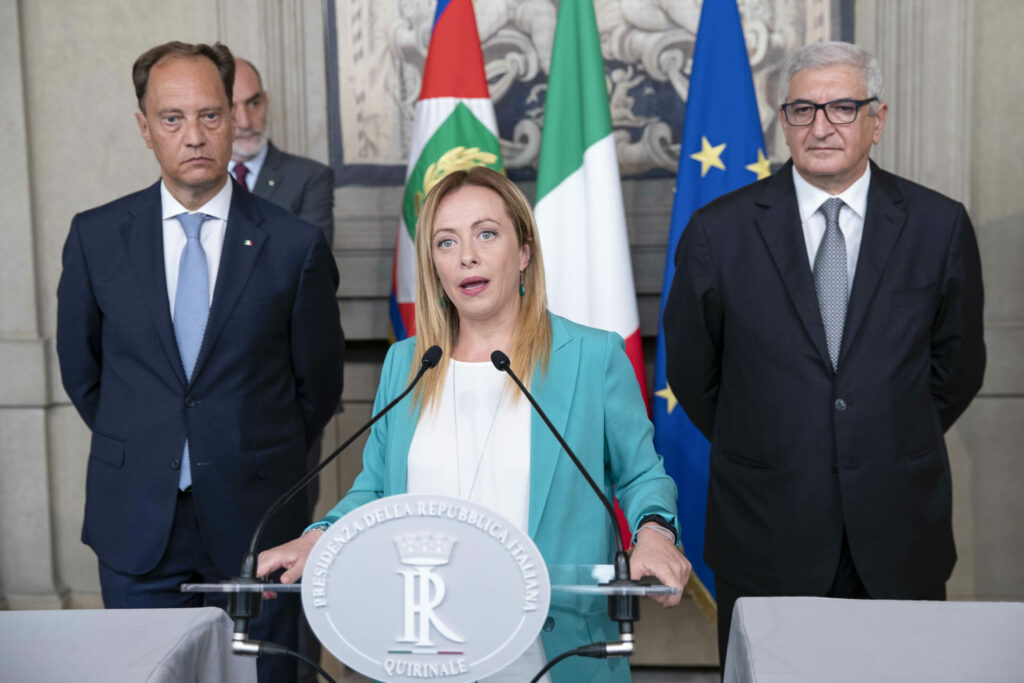BRUSSELS BEHIND THE SCENES
Weekly analysis and untold stories
With SAM MORGAN
When life gives you Meloni...
Italy has its first ever female prime minister, a milestone that would normally be worth celebrating. But a sense of foreboding and uncertainty about where Giorgia Meloni will lead her country eclipses that breakthrough moment.
Italy has ranked among the least progressive countries when it comes to gender equality in political leadership. No woman has served as president and until this week, there had never been a female prime minister.
But after Giorgia Meloni cobbled together a far-right government—the first to lead Italy since World War II—that ignominious accolade no longer applies.
Indeed, Italy can now lord it over the likes of France, Ireland, the Netherlands, Spain and many more European countries, all of which have always been led by men. At the next EU Council summit there will be five(!) female leaders around the table.
Belated glass-ceiling smashing aside though, Meloni’s elevation to Italy’s top job potentially brings more bad than good.
BRUSSELS BEHIND THE SCENES is a weekly newsletter which brings the untold stories about the characters driving the policies affecting our lives. Analysis not found anywhere else, Sam Morgan helps you make sense of what is happening in Brussels. If you want to receive Brussels behind the scenes straight to your inbox every week, subscribe to the newsletter here.
The make-up of Meloni’s far-right government was only announced earlier this week, so for the time-being at least is still the boogeyman under the bed. It is a scary prospect but has not done any actual harm. At least, not yet.
Meloni’s tearing down of the Italian political system’s patriarchy is so far only limited to her own job. Just a quarter of her cabinet is female and all the top positions have gone to men. That makes her administration more in the vein of Margaret Thatcher’s Tories than a Scandinavian-style government where gender equality is not just a soundbite.
The new prime minister is no fool, she knows where the main hurdles are located ahead. Conflict with the EU has to be avoided so that billions of euros of recovery funding are not delayed and economic damage wrought by spooked markets.
Appointing Antonio Tajani, a former president of the European Parliament, as foreign minister buys her government time and good faith in Brussels, even if Silvio Berluconi’s right-hand man is severely tainted by his boss’ recent pro-Putin statements.
Meloni has also kept Lega leader Matteo Salvini away from the interior ministry, robbing him of a chance to build popular support by blowing his immigration dog whistle. His former deputy is in charge instead though, so Salvini might yet run the show from the shadows.
Political analysts expect Meloni to chart a moderate course, at least in her first few months in power, not engaging in ‘blame Brussels’ rhetoric from the off or upsetting any apple carts.
That does not mean she will not pursue a domestic agenda that at the very worst, threatens to look like something out of a Margaret Attwood novel. Time will tell whether accusations of fascism are hyperbole or Cassandrian predictions.
What the neighbours think
Meloni’s peers have all sent in their obligatory messages of congratulations, wishing her well in her new job and urging her to continue the good cooperation Italy enjoyed while under the captaincy of Mario Draghi.
Ursula von der Leyen cheekily tweeted a picture of herself on the phone with Meloni in front of a big picture of the signing of the Treaty of Rome. A very obvious reminder of Italy’s European history and obligations under EU law.
Meloni’s rightwing counterparts in Hungary and Poland meanwhile lauded her successful government-forming efforts as proof that their segment of the political spectrum is gaining in popularity.
Herein lies the danger that progressives fear will infect democracies in other European countries. Not the full monstrous potential of a rightwing government that cares not a jot for women’s or migrants’ rights. Something a little more sinister: normalisation.
If Meloni can hold together her government coalition—no easy task in the months ahead, given the competition between the three parties and the vagaries of Italian politics—and chart a respectable course for Italy, it will make ‘all of this’ part of the status quo rather than an ugly blip.
That puts the very concept of a cordon sanitaire in other countries at risk. It is already on shaky ground—some would say the ground has already given way—in the European Parliament and elections are just around the corner.
But there is a reason that rightwing governments are not the norm across Europe and why the long-talked-about ‘supergroup’ of rightwing forces in the European Parliament has never materialised.
Rightwing forces are as different to one another as leftwing political groups and families. It is like herding cats at times, as everyone goes off in their own direction to pursue their own political interests.
Meloni will face the same challenge, especially with self-interested personalities like Salvini and Berlusconi in the mix. Can she last more than the 44 days Liz Truss did in the UK? Almost certainly.
Can she last long enough to impose her agenda on Italy and affect its course—for better or worse—in a substantial way? That is less clear but she has shown enough political acumen to get to the top job in the first place. She may have enough to stay there.
BRUSSELS BEHIND THE SCENES is a weekly newsletter which brings the untold stories about the characters driving the policies affecting our lives. Analysis not found anywhere else, Sam Morgan helps you make sense of what is happening in Brussels. If you want to receive Brussels behind the scenes straight to your inbox every week, subscribe to the newsletter here.

